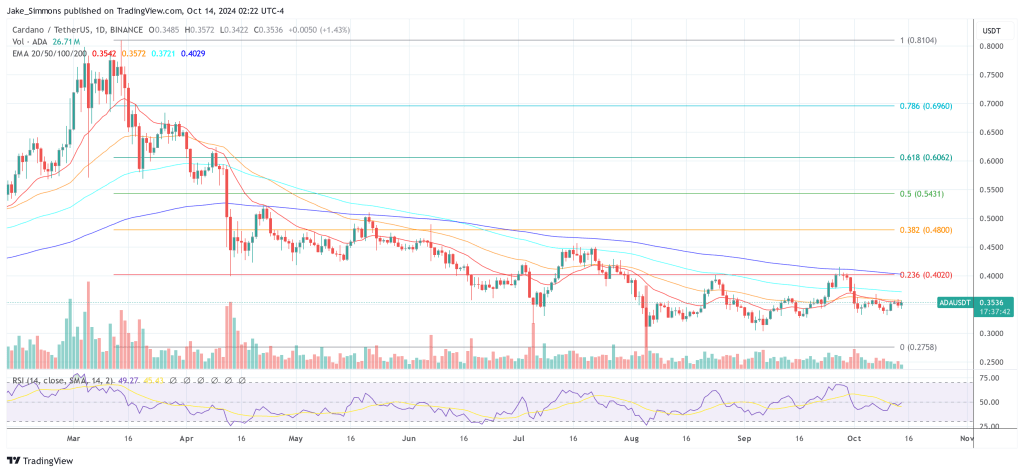Charles Hoskinson, the creator of Cardano, revealed a novel framework for blockchain governance during his recent broadcast, introducing what he describes as a “Bill of Rights” for the Cardano ecosystem. This initiative, focusing on 11 fundamental blockchain principles, aims to lay a constitutional groundwork that will steer the development and governance of Cardano, potentially shaping broader blockchain technologies.
Live from Colorado on October 13, 2024, Hoskinson stressed the collaborative nature of this initiative. “Over 50 workshops have taken place,” he noted. The process has engaged 1,400 participants and resulted in the election of 63 delegates.
At the core of Hoskinson’s announcement is a blog post titled “The 11 Blockchain Principles Towards a Blockchain Bill of Rights.” He clarified that these principles are not limited to Cardano but are designed as a universal framework applicable across various blockchain systems. “These principles aim to encapsulate the inherent durability of these systems and the rights of their users,” Hoskinson elaborated, drawing parallels to human rights established in constitutional law.
The 11 Cardano Blockchain Principles
Hoskinson provided a comprehensive analysis of each of the 11 principles, explaining their significance and practical applications for Cardano:
- Transaction Censorship Resistance: “Transactions must not be delayed or censored and should be promptly processed for their intended use,” Hoskinson asserted. He compared this principle to freedom of speech, underlining the need for user autonomy within the system. “Transactions represent how users wish to engage with the system, so they should have the freedom to do so in a manner aligned with their intentions; this excludes censorship while ensuring expediency and processing.”
- Predictable Transaction Costs: Hoskinson emphasized that “the cost of a transaction should be foreseeable and must not be excessive,” which is vital for user planning and sustainability of the system. He acknowledged the difficulties in balancing resource allocation with user intent, especially under high demand. Mechanisms such as tiered pricing and intent-based ledgers are being examined to tackle these challenges.
- Fair Recognition And Compensation: Addressing fair treatment of contributors, Hoskinson remarked, “Every user’s contributions to the system will be acknowledged, logged, processed, and evaluated fairly.” This principle seeks to guarantee that both maintenance and development efforts receive appropriate rewards, avoiding incentive failures within the ecosystem. He also pointed out the necessity for fair compensation of various roles, from stake pool operators to governance participants.
- Data And Value Portability: Echoing principles akin to the European Union’s General Data Protection Regulation (GDPR), Hoskinson stressed the significance of user consent in managing data. “The data and value users contribute or generate will not be locked or processed without their consent,” he stated. He promotes user control over personal assets and information.
- Resource Efficiency: “No resources will be needlessly consumed,” Hoskinson explained, highlighting the importance of optimizing resource use through effective protocol design. This principle aims to prevent systemic bloating and ensure the blockchain’s long-term sustainability. Examples include protocol optimizations that decrease transaction sizes without compromising security.
- Safe Preservation Of Value And Information: Hoskinson discussed the dual aspects of this principle: safeguarding the integrity of information against risks like quantum attacks and ensuring value stability through mechanisms such as stablecoins. “The system will safely uphold the value and information it contains,” he stated, emphasizing that both data integrity and asset stability are critical components.
- Minimization Of Unnecessary Resource Expenditure: This principle focuses on resource optimization, ensuring that Cardano functions efficiently without wasting resources. Hoskinson referenced the shift from Plutus V1 to V2 as an example, where transaction sizes were significantly reduced, enhancing overall system efficiency.
- Fair And Representative Governance: “The system will treat users justly and will evolve according to their collective will, aiming for long-term sustainability and viability,” Hoskinson declared. This principle highlights the need for inclusive governance, wherein all stakeholders have a voice in the system’s development. The forthcoming Constitutional Convention in Buenos Aires aims to formalize these governance principles.
- User Privacy Preservation: Stressing the importance of data privacy, Hoskinson stated, “Users’ privacy concerning their actions and information should be protected.” Drawing connections to GDPR, he advocated for minimal disclosure and selective, contextual data sharing. This principle balances transparency and privacy, ensuring users retain control over their personal information.
- Compliance with Local Laws and Regulations: “The system will provide users with ways to engage that do not require them to violate local laws and regulations,” Hoskinson explained. This principle recognizes the global aspect of Cardano and the necessity for users to comply with their respective legal frameworks.
- Transparency, Predictability, and Verifiability: The final principle mandates that “the system’s operations should be transparent, foreseeable, verifiable, interpretable, and free of asymmetries.” Hoskinson emphasized the necessity of open-source protocols and public verifiability to foster trust and accountability within the ecosystem.
The Path Ahead
Hoskinson detailed the continuous efforts to formalize these principles through decentralized governance. “Decentralized governance is essential before proceeding down that road because only through it can decisions be made for everyone everywhere; that’s the essence of Voltaire,” he remarked. The upcoming Constitutional Convention in Buenos Aires, Argentina, scheduled for December 2024, will gather delegates from 50 countries to finalize and ratify the constitutional text based on these principles.
The founder underscored the broader significance of this initiative beyond Cardano, suggesting that other blockchain communities could adopt similar frameworks to balance technical innovation with ethical governance. “These principles are actively discussed by the Cardano community […] they will serve as guiding lights for Cardano and other blockchain communities, leading them toward their intended destinations,” Hoskinson stated.
Hoskinson concluded the broadcast by emphasizing the importance of safeguarding the system’s integrity over short-term advantages. “We should never compromise the integrity of the system for temporary gains or to achieve arbitrary metrics, such as token price or adoption,” he asserted.
As of the latest update, ADA was trading at $0.3536.

Featured image from YouTube, chart from TradingView.com








